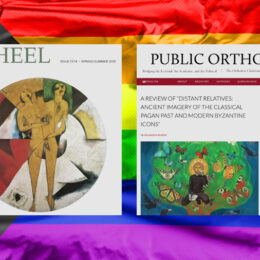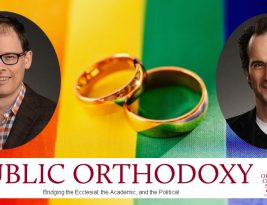OrthodoxyToday.org | Fr. George Morelli | Mar. 15, 2008
In the first chapter of Genesis we read that man is made in God’s image and called to be like Him. The image, the Church Fathers say, is mainly our intelligence and free will. God so loved us, He sent His only begotten Son for our salvation (John 3:16).
If we put on Christ at baptism and continue to wash ourselves through repentance, then we are able to reflect the light of Christ. Our constant prayer is “Lord Jesus Christ, Son of God, have mercy on me the sinner.” We are creatures. We have no independent existence. We depend on God for all and by his mercy we can have the light of Christ indwell in us. This is a spiritual reality revealed by Our Lord Jesus Christ Himself. The value of this is unfathomable.
[…]
Passions: The Inclinations to Sin
After the Fall we are predisposed to self-centered choices directed by the passions (lusts) rather than choices based on agape. St. Isaac of Syria tells us: “. . . pandering to the flesh, produce(s) in us shameful urges and unseemly fantasies” (Early Fathers from the Philokalia).
The passions spring from the heart of the person. Jesus told us: “For from within, out of the heart of man, come evil thoughts, fornication, theft, murder, adultery, coveting, wickedness, deceit, licentiousness, envy, slander, pride, foolishness. All these evil things come from within, and they defile a man” (Mark 7: 21-23).
St. Paul wrote “While we were living in the flesh, our sinful passions, aroused by the law, were at work in our members to bear fruit for death” (Romans 5:7). The work of the passions can take place either before marriage or after the marital union takes place. In either case they lead to a choice of singularity or self-satisfaction over a righteous joined union.
Passions may predispose a individuals to discord from God and mankind. St. Paul’s warning applies to the “demon’s” attack union with God and neighbor: “Now the works of the flesh are plain: fornication, impurity, licentiousness, idolatry, sorcery, enmity, strife, jealousy, anger, selfishness, dissension, party spirit, envy, drunkenness, carousing, and the like. I warn you, as I warned you before, that those who do such things shall not inherit the kingdom of God” (Galatians 5:19-21). The Church Fathers attribute this to the demon of each passion that never tires of breaking union with God and mankind.
An example of how this works may aid our understanding. The demon of lust, the Church Fathers tell us, may take over our lives. Modern society facilitates this malady. Sex is broadcast everywhere for almost every use: art, fashion, music, news, pornography (especially the Internet), and the sale of almost any product from automobiles to computers, The secular world flagrantly exposes body parts, especially the genital areas.
The Church Fathers knew about such enticements a thousand years ago. St. Isaac of Syria wrote: “Passions are brought either by images or by sensations devoid of images and by memory, which at first is unaccompanied by passionate movements or thoughts, but which later produces excitation.” One way to deal with these passions, continued St. Isaac: ” . . . their thought must become attached to nothing except their own soul.”
. . . more




Very edifying reading for this Lent. Thank you, Father.